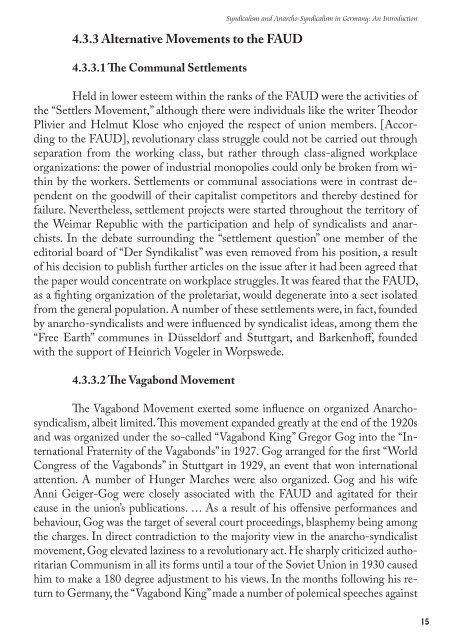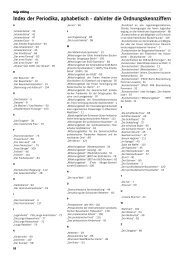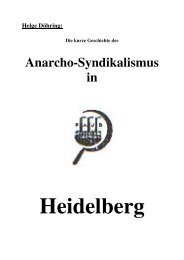Syndicalism and Anarcho-Syndicalism in Germany - Institut für ...
Syndicalism and Anarcho-Syndicalism in Germany - Institut für ...
Syndicalism and Anarcho-Syndicalism in Germany - Institut für ...
- No tags were found...
Create successful ePaper yourself
Turn your PDF publications into a flip-book with our unique Google optimized e-Paper software.
4.3.3 Alternative Movements to the FAUD4.3.3.1 The Communal Settlements<strong>Syndicalism</strong> <strong>and</strong> <strong>Anarcho</strong>-<strong>Syndicalism</strong> <strong>in</strong> <strong>Germany</strong>: An IntroductionHeld <strong>in</strong> lower esteem with<strong>in</strong> the ranks of the FAUD were the activities ofthe “Settlers Movement,” although there were <strong>in</strong>dividuals like the writer TheodorPlivier <strong>and</strong> Helmut Klose who enjoyed the respect of union members. [Accord<strong>in</strong>gto the FAUD], revolutionary class struggle could not be carried out throughseparation from the work<strong>in</strong>g class, but rather through class-aligned workplaceorganizations: the power of <strong>in</strong>dustrial monopolies could only be broken from with<strong>in</strong>by the workers. Settlements or communal associations were <strong>in</strong> contrast dependenton the goodwill of their capitalist competitors <strong>and</strong> thereby dest<strong>in</strong>ed forfailure. Nevertheless, settlement projects were started throughout the territory ofthe Weimar Republic with the participation <strong>and</strong> help of syndicalists <strong>and</strong> anarchists.In the debate surround<strong>in</strong>g the “settlement question” one member of theeditorial board of “Der Syndikalist” was even removed from his position, a resultof his decision to publish further articles on the issue after it had been agreed thatthe paper would concentrate on workplace struggles. It was feared that the FAUD,as a fight<strong>in</strong>g organization of the proletariat, would degenerate <strong>in</strong>to a sect isolatedfrom the general population. A number of these settlements were, <strong>in</strong> fact, foundedby anarcho-syndicalists <strong>and</strong> were <strong>in</strong>fluenced by syndicalist ideas, among them the“Free Earth” communes <strong>in</strong> Düsseldorf <strong>and</strong> Stuttgart, <strong>and</strong> Barkenhoff, foundedwith the support of He<strong>in</strong>rich Vogeler <strong>in</strong> Worpswede.4.3.3.2 The Vagabond MovementThe Vagabond Movement exerted some <strong>in</strong>fluence on organized <strong>Anarcho</strong>syndicalism,albeit limited. This movement exp<strong>and</strong>ed greatly at the end of the 1920s<strong>and</strong> was organized under the so-called “Vagabond K<strong>in</strong>g” Gregor Gog <strong>in</strong>to the “InternationalFraternity of the Vagabonds” <strong>in</strong> 1927. Gog arranged for the first “WorldCongress of the Vagabonds” <strong>in</strong> Stuttgart <strong>in</strong> 1929, an event that won <strong>in</strong>ternationalattention. A number of Hunger Marches were also organized. Gog <strong>and</strong> his wifeAnni Geiger-Gog were closely associated with the FAUD <strong>and</strong> agitated for theircause <strong>in</strong> the union’s publications. … As a result of his offensive performances <strong>and</strong>behaviour, Gog was the target of several court proceed<strong>in</strong>gs, blasphemy be<strong>in</strong>g amongthe charges. In direct contradiction to the majority view <strong>in</strong> the anarcho-syndicalistmovement, Gog elevated laz<strong>in</strong>ess to a revolutionary act. He sharply criticized authoritarianCommunism <strong>in</strong> all its forms until a tour of the Soviet Union <strong>in</strong> 1930 causedhim to make a 180 degree adjustment to his views. In the months follow<strong>in</strong>g his returnto <strong>Germany</strong>, the “Vagabond K<strong>in</strong>g” made a number of polemical speeches aga<strong>in</strong>st15








